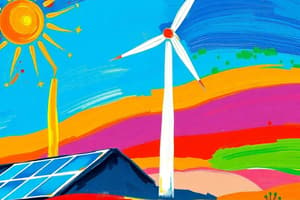Podcast
Questions and Answers
What century does the content refer to?
What century does the content refer to?
- Eleventh century
- Ninth century
- Tenth century (correct)
- Eighth century
The content indicates that the period discussed is short.
The content indicates that the period discussed is short.
False (B)
What is the primary focus of the content regarding the century mentioned?
What is the primary focus of the content regarding the century mentioned?
It refers to a long period.
The content discusses the __________ century.
The content discusses the __________ century.
Match the following centuries with their descriptions:
Match the following centuries with their descriptions:
What is the primary focus of modern energy availability?
What is the primary focus of modern energy availability?
The increase of energy availability in the present requires less reliance on fossil fuels.
The increase of energy availability in the present requires less reliance on fossil fuels.
What can contribute to enhancing energy availability today?
What can contribute to enhancing energy availability today?
The shift towards __________ energy sources is crucial for energy availability.
The shift towards __________ energy sources is crucial for energy availability.
Match the following energy sources with their characteristics:
Match the following energy sources with their characteristics:
Flashcards
19th Century
19th Century
A long period of time, available since the past
Long period
Long period
A significant amount of time, spanning a number of years
Available Since Past
Available Since Past
Something that is accessible from a time in the past
Century
Century
Signup and view all the flashcards
Time Period
Time Period
Signup and view all the flashcards
Current energy solution
Current energy solution
Signup and view all the flashcards
Energy availability
Energy availability
Signup and view all the flashcards
Alternative energy
Alternative energy
Signup and view all the flashcards
Present energy source
Present energy source
Signup and view all the flashcards
Energy substitution
Energy substitution
Signup and view all the flashcards
Study Notes
Alternative Energy Sources
- Alternative energy is a substitute for traditional fossil fuel-based energy sources like coal and oil.
- Hydropower in the 19th century and nuclear power in the 20th century were early forms of alternative energy.
- Today, the availability and variety of alternative energy sources are more extensive than ever before.
- The increasing use of clean alternative energy signifies a shift towards a new definition of traditional energy.
How Alternative Energy Works
- Alternative energy produces power in different ways than fossil fuels.
- Most alternative energy sources do not produce carbon dioxide as a byproduct. (Examples that do, like biofuel, tend to be carbon-neutral).
- Traditional energy relies on combustion to release energy stored in fossil fuels. Alternative energy sources release energy through various methods, including combustion of resources like methanol and biomass, as well as other methods.
Importance of Alternative Energy
- Traditional energy sources are finite and will eventually run out.
- Alternative energy sources provide power without adding to the greenhouse gases (GHGs) accumulating in the atmosphere.
Differences Between Alternative and Traditional Energy
- Fossil fuels have been the dominant traditional energy form.
- Alternative energy often comes in renewable forms, though it is not a requirement.
- Many of the new energy forms are renewable, but there are also non-renewable, carbon-free, and innovative alternative energy sources.
Differences Between Alternative and Renewable Energy
- All renewable energy sources are alternative energy sources, but not all alternative energy sources are renewable.
- Non-renewable, carbon-free, and innovative forms of alternative energy could be perfect for the future, although they are not renewable.
Types of Alternative Energy
- There are many types of alternative energy, both renewable and non-renewable.
- Some types are more suitable for widespread use than others, although different types are used in various parts of the world.
- Each type has unique benefits for the global energy future.
Examples of Alternative Energy Sources
- Solar and wind energy are frequently cited examples of alternative energy, but usage has become widespread enough to be considered near-traditional energy.
- Hydropower is another widely used energy form, particularly in countries like Canada and Norway.
- Nuclear power is a traditional alternative, though it's less prevalent.
- Emerging alternative energies include geothermal energy, hydrogen, methanol, small modular reactors, and biofuels.
Studying That Suits You
Use AI to generate personalized quizzes and flashcards to suit your learning preferences.





